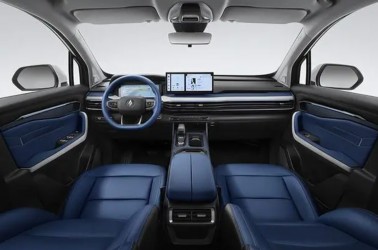You can buy this 7-seat electric SUV for less than $16,000
China - the world of wonders. Great food, great people and about 100 electric car brands. Big names just keep adding sub-brands to corner every possible market niche, new joint ventures compete with brand new start-ups for every slice of the immensely crowded EV scene.
Ruilan 9 is an example of this drive to conquer every segment possible, the brand is the result of joint venture between Geely and Lifan and it was established only in January of this year. Although the grab-line here is the ridiculously low price of $15,750 there is far more to this car that makes it really interesting.

First of all the price already includes subsidy and it’s for the cheapest model, the most expensive version will set the buyer back $18,600 at current exchange rates. Then there is the 4 year and 150,000 km warranty with the battery getting an 8 year cover with the same 150,000 km limit.
The most interesting bit - in my humble opinion - is yet another battery swappable technology. The Ruilan 9 is based on a brand new GBRC Crystal architecture - it stands for Global Battery Rapid Change and it allows for 1-minute fast battery swap or 40 minute DC fast charging.

The GBRC platform comes with an upgradable capsule-type battery which means as the technology progresses, owners of the car can simply upgrade their battery in just one minute keeping the car - in theory - operational for many years.
The car features a “super” heat pump system which apparently offers one of the widest operational ranges from -30 to +43 Celsius (-22F to 109F). The slow charging is supported as well of course, with the home charging up to 7 kW or even at a slower speed of 2 kW possible.
The reason why the price of the Ruilan 9 is so low is because it doesn’t include the cost of the battery pack. Ruilan is yet another company trying its luck at the subscription business model. Customers can get the car at a lower price but need to rent the battery at the equivalent of $128.70 per month. Interestingly that pays for either the 66.57 kWh or the smaller 52.56 kWh battery packs. Customers do have the option to own the batteries but that adds $10,030 for the larger and $8,600 for the smaller battery to the price of the car.
The car itself is a straightforward, medium-sized 7-seat SUV powered by a single 150 kW electric motor. The design is restrained to make sure the car appeals to as many buyers as possible and the car offers up to 2,360 l of cargo space with all the rear seats down.
The interior is really nice and restrained again, the central screen is only 12.3 inch and the instrument cluster is only 8 inch diagonally - both are rather slim keeping the cabin looking airy and spacious. The air outlets are nicely combined into the lower part of the dashboard to complement the overall feel of quality.
When it comes to driving the Ruilan 9, it can travel for up to 380 km with the smaller battery and up to 470 km with the larger one according to the very optimistic CLTC standard. The battery swapping happens at the Ruilan designed battery swap station which the company promises will be available in 100 cities across China by 2025 - 5,000 units are planned which should be sufficient for the future customers.
The battery swapping seems to be picking up, Nio was the clear pioneer here but other companies are jumping on board - CATL has its own brand and now Geely joins the ranks. The subscription model is gaining traction as well, many people like the idea of lower upfront cost and prefer monthly payments in exchange for pretty much worry-free battery for as long as they keep the car.
What’s your take on the battery tech and battery subscription? Would you prefer a cheaper car in exchange for monthly battery rent? Do you think battery swapping has a future or will it fade away just like the fidget spinners did?
Via (Chinese)







Facebook
Twitter
Instagram
RSS
Settings
Log in I forgot my password Sign up